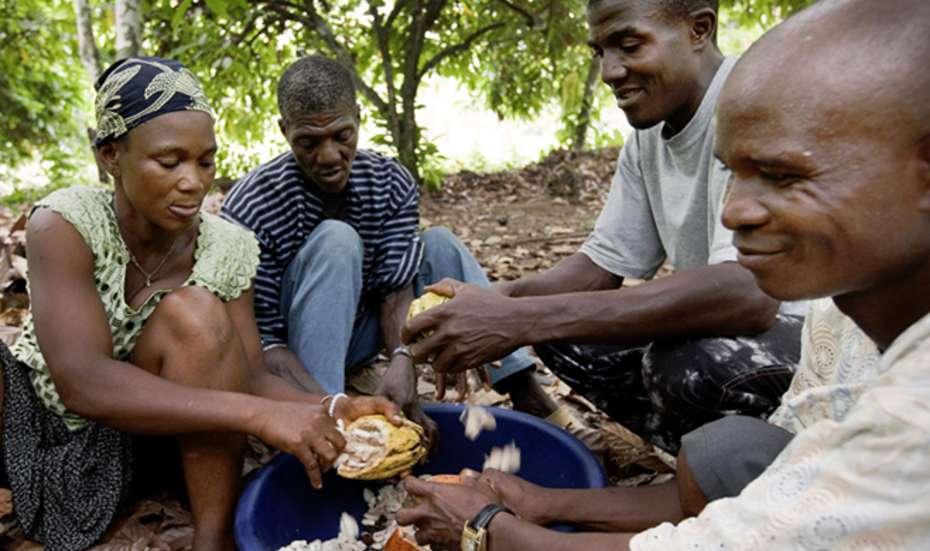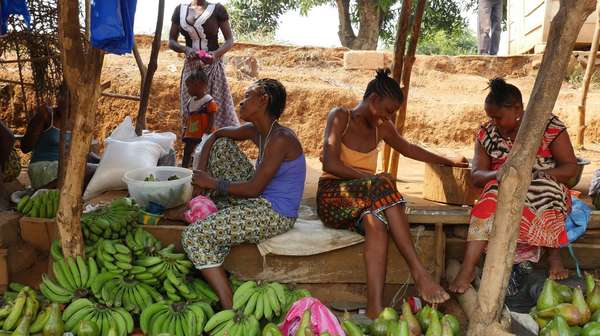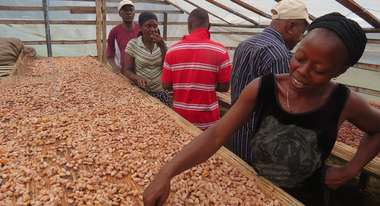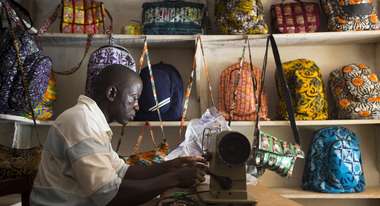Linking Agriculture, Natural Resource Management and Nutrition (LANN+)
New Beginnings with Organic Cocoa
Welthungerhilfe supports smallholder farmers in Sierra Leone start over with ecological agriculture.

In 2002, Sierra Leone marked the end of a long civil war that still traumatises an entire nation today. Murder and rape left families deeply scarred, and the economy is also still suffering from the consequences of destruction and political turmoil. Unemployment, lacking education opportunities and poor medical care define daily life.

Cocoa Farmers in Sierra Leone
Although the country is rich in natural resources and is currently considered to be politically stable, extreme poverty is prevalent. The lack of health care has led to one of the highest infant mortality rates in the world (GHI 2023: In Sierra Leone, the mortality rate for children under five years of age is 10.5%). Malnutrition and malaria are also common.
Ruined Fields, Poor Prices
Traditionally, cocoa has been one of Sierra Leone’s most important export products. However, most farmers were forced to leave their villages during the civil war, and their fields lay fallow for many years. When the rebels and soldiers finally made peace and the cocoa farmers returned to their villages, they found only destruction: Many of their houses had been burnt to the ground, and their fields lay in ruins.
Anyone who could still sell a little cocoa in spite of everything could hardly provide for a family with the proceeds, since the crop quality was so low that selling prices fell far below the global market price. Cocoa production actually has great potential: Prices are rising and the markets for fair-trade cocoa are growing steadily.
In order to develop this potential, Welthungerhilfe is tackling the problem together with the smallholders. Fallow fields are being rehabilitated, and new cocoa trees are being planted. Tree nurseries are producing saplings for the future, and training sessions are instructing farmers on low-impact fermentation, drying and storage processes.
Better Conditions due to Organic Cocoa and Cooperatives
Cocoa beans with fairtrade and organic certifications generate significantly higher prices on the global market. Last year, 7,000 farming families became certified. Welthungerhilfe supported them during the transition and familiarised them with the rules of ecological agriculture. In five years’ time, 40,000 families are projected to be able to live from their harvest. In cooperatives, they can sell the cocoa directly to the exporter, circumventing the middlemen that force them into dependence and make a profit at their expense.
The fact that the farmers are organising in groups also has benefits for marketing: They obtain better prices on the market and finally receive a fair wage for their work.
How Welthungerhilfe Supports People in Sierra Leone
- Smallholders receive new, formerly fallow fields and cocoa trees, tools and saplings. Tree nurseries produce plants for the future.
- In training sessions, smallholders are familiarised with modern cultivation methods that protect the soil and still achieve higher yields. They also learn about low-impact processing methods.
- Welthungerhilfe is supporting smallholders during the transition to fairtrade and organic certifications, since they can then obtain higher prices on the market and protect their soil and environment.
- By organising into cooperatives, smallholders can gain independence from middlemen and receive fair wages.







